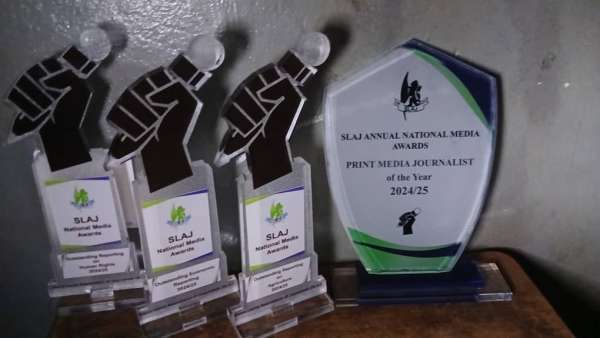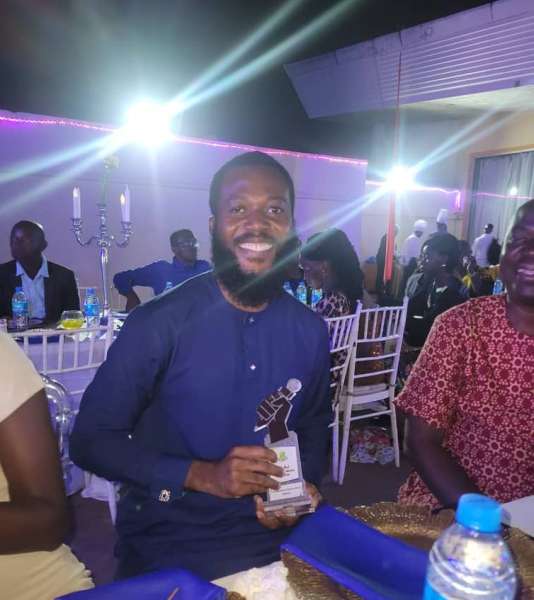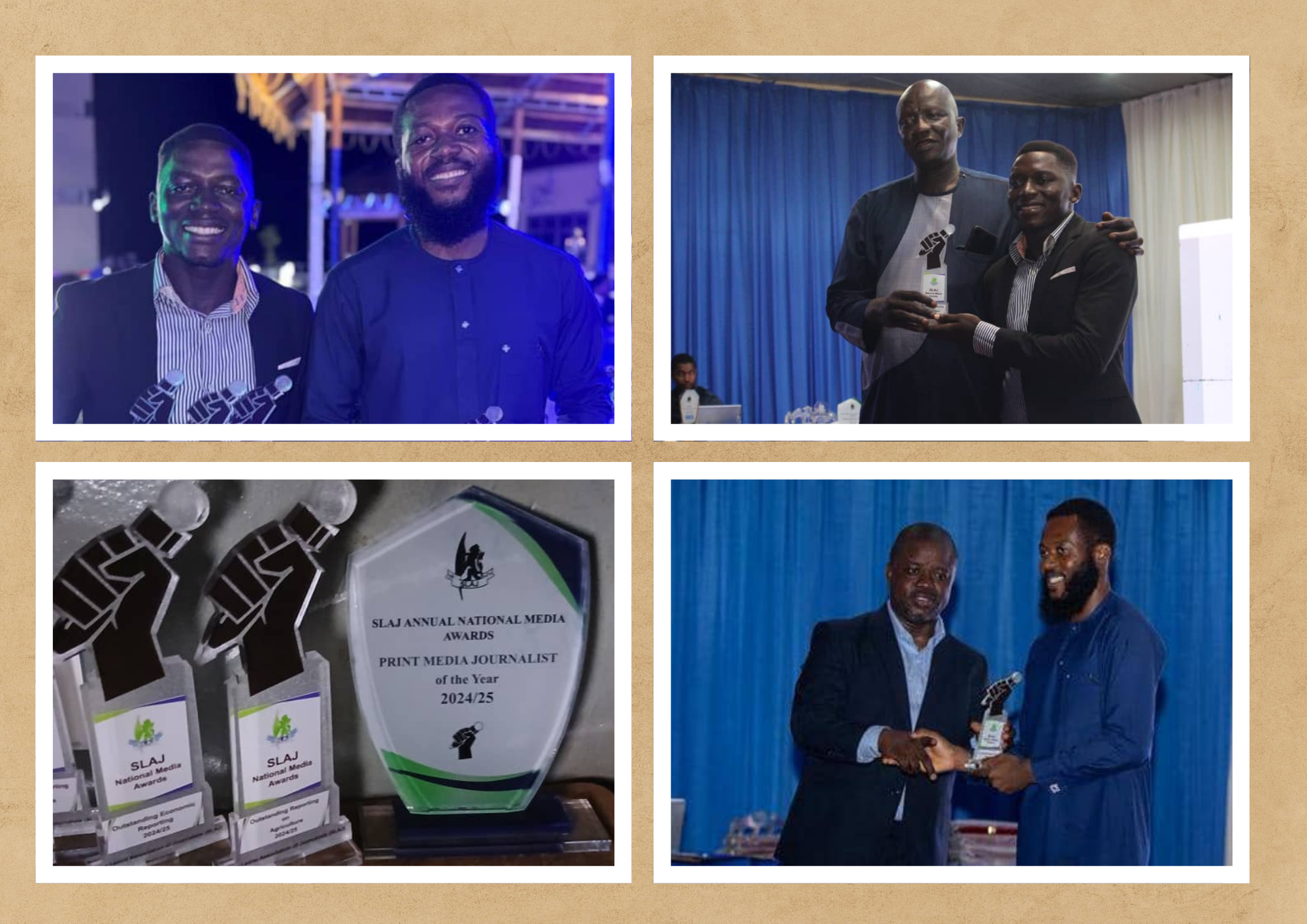When the spotlight beamed on Alfred Koroma and Joseph Johnson at the Sierra Leone Association of Journalists (SLAJ) 2024/2025 National Media Awards night, it was a personal triumph for two dedicated journalists and presented a defining moment for a new wave of public-interest reporting.
Both journalists are alumni of the Digital Public Infrastructure (DPI) Journalism Fellowship, a project being implemented by the Media Foundation for West Africa (MFWA) and funded by Co-Develop to enhance the adoption, public discourse and understanding of digital public infrastructure and digital public goods (DPGs) across West Africa.
Together with other alumni, Alfred and Joseph’s work illustrates the fellowship’s growing legacy; how training in digital public infrastructure can spark award-winning journalism, open policy conversations, and improve public services.
Alfred Koroma: Raising the Alarm on Mobile Money and Digital Inheritance
Alfred Koroma, a print journalist with Concord Times Newspaper, emerged as one of the night’s biggest winners, taking home four awards, including one for his DPI-themed report: “The Untold Story of Mobile Money Accounts: What Happens When Users Pass Away?”

As Sierra Leone rapidly embraces mobile financial services, Alfred’s story explored a critical but neglected question: what becomes of mobile money accounts when users die? His investigation revealed gaps in regulation, unclear next-of-kin protocols, and financial hardships endured by families unable to access the digital assets of deceased relatives.
“Many people don’t even know what happens to their accounts when they die,” Alfred said. “There are no clear policies to protect families.”
Produced during his time as a DPI Fellow, the story has stirred public dialogue and even reached officials at Afri Money, one of the country’s leading digital finance platforms.
“Robert Charles, Communications Supervisor at Afri Money, acknowledged the importance of the issue, noting that next-of-kin protocols had never really been on their radar.” He shared.
The Fellowship, according to Alfred, transformed how he approaches journalism. “Before the fellowship, I found it challenging to write in-depth stories. But through the program, I gained the skills to analyze digital systems and frame complex DPI issues in a human-centered way. I also improved my interviewing techniques and storytelling tools, which helped me make technical issues relatable to everyday people.”

Alfred also won awards for stories spotlighting child labor in fishing villages and climate devastation in rice-growing communities in Sierra Leone, cementing his reputation as a journalist who reports where it matters most. He was also adjudged the “Print Media Journalist of the Year.”
Joseph Johnson: From Personal Pain to Public Progress in Health
For Joseph Johnson, a broadcast journalist with AYV Media Empire, his award-winning DPI story did not begin in his newsroom, but in a hospital waiting room.

“A loved one was sick and we had a terrible experience with the previous system,” he recalled.
“After hours of waiting to see the doctor, everything was recorded but along the line, we were told the medical file was missing—charts, prescriptions, everything. It was frustrating, expensive, and traumatic.”
Motivated by that experience, Joseph’s story documented how Connaught Government Hospital, Sierra Leone’s largest public medical facility, transitioned from paper-based records to a Digital Electronic Medical Records (EMR) system.
The TV report, produced during the DPI Fellowship showed how the new system reduced delays, prevented record loss, and improved care delivery. Since its publication, the impact has been tangible.
“People are now more aware of how EMRs are improving healthcare. Some say they no longer wait hours or lose documents. Other hospitals are now using Connaught’s example to explore their own digital transition,” he shared.
Joseph believes the DPI Fellowship activated a turning point in his journalism career. According to him, the fellowship helped him reimagine journalism not just as a means of informing, but as a tool for connection, advocacy, and problem-solving.
A Fellowship Anchored in Impact
The MFWA’s DPI Journalism Fellowship which was launched in 2023, is focused on elevating public awareness, debates, participation, inclusivity, and uptake of Digital Public Infrastructure (DPI) in West Africa through increased professional media reporting and public discourse on the region’s DPI and Digital Public Goods (DPGs).
Now in its second phase, the Fellowship has supported 65 journalists from Benin, Cape Verde, Cote d’Ivoire, Ghana, Mauritania, Niger, Nigeria, Sierra Leone, Senegal, The Gambia and Togo, equipping them with the skills, mentorship, and networks needed to produce deeply impactful DPI related journalism.
The Phase I of the Fellowship, which produced fellows like Alfred and Joseph, significantly improved media coverage and broadened public discourse on DPI/DPGs in West Africa. This was largely as a result of 115 stories that were produced and published under the first phase.

Some of the stories focused on the national identification system and its challenges as in Ghana and Nigeria; online passport application and its data security challenges in Nigeria; and digitalisation and healthcare in Cape Verde. Most of the published stories provoked reactions from some government institutions and state actors in the various focused countries.
Notably, a story focusing on the Diamniadio Datacenter, a major national infrastructure project in Senegal by a Fellow from the media outlet Press Afrik, prompted the government to start using a national data storage center which had become a white elephant. This resulted in the safeguarding of public and country’s data. The same story also won an award at the sixth edition of the E-jicom Journalism Awards in Senegal.
Another Fellow from Premium Times in Nigeria wrote an impactful story on unreceipted payments for birth attestation certificates exposing corrupt practices in the country’s National Population Commission (NPC) Abuja office ultimately leading to stringent reforms.
The government of Cape Verde introduced a self-invoicing tool for the informal sector in response to challenges highlighted by a Fellow at Radio Morabeza. The Fellow’s report exposed issues with the initial e-invoice system, which created tensions between taxpayers, the informal sector, and the state.



